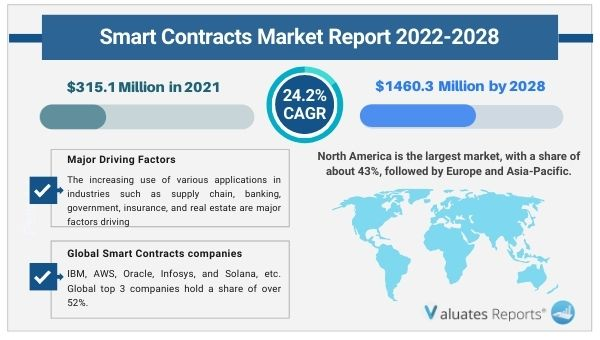A contract between a seller and buyer has existed for thousands of years since the beginning of trade. They remain an essential part of services or business. With Blockchain technology, these contracts can be made into Smart Contracts which are transparent, traceable, and irreversible. These are possible without an intermediary’s involvement or time loss. Additionally, these Contracts are more than the convention contract in the sense that they could do several other activities.
What are smart contracts?
To put it in a very simple way, Smart Contracts are self-executing computer code stored on a blockchain that runs when predetermined conditions are met. These can facilitate the automated execution of an agreement. The participants or companies involved will immediately know whether the transaction has been successfully made. The most popular blockchain for running smart contracts is Ethereum.
To understand more about these contracts, one needs to go to the origin of cryptocurrency. Bitcoin is the first cryptocurrency that was based on blockchain technology. Ethereum was also based on the same technology but it further created applications that go beyond just enabling a digital currency. Ethereum technology supports Smart Chain as well as Decentralized Apps. Ethereum’s primary differentiator has been its use of smart contracts.
These Contracts follow IF-THEN semantics and are open source codes based on
Why are Smart Contracts important?
Since Blockchain technology facilitates borderless transactions smoothly, these contracts support trusted transactions and agreements to be carried out among anonymous parties without the need for a legal system, government authority, or external agencies. One can add as many conditions and the contract will be complete if all the conditions are met. Since these Contracts are stored in a distributed system, both parties can interact with each other in real-time.
Since it is based on decentralized technology, it is not easy to tamper with it. Unless all the preconditions are not met, the contract will not be executed. When conditions are met, they can automate a workflow, triggering the next action. One of the advantages of the Contract is predicted outcomes without fail.
Popular Smart Contract Protocols
Most blockchain-based smart contracts are built on Ethereum. There are many other blockchains that support Smart Contracts, namely, Cardano, Polkadot, Solana, Stellar, Fabric, NEM, Algorand, Ergo, Tezos, Hedera, Tron, etc.
Created in 2015, Ethereum has its own programming language, called Solidity. Ether is the cryptocurrency of the platform. Though like Bitcoin it relies on a Proof-of-Work (PoW) protocol to mine blocks and verify transactions, the differentiator is the speed. The popularity of Ethereum was backed by a much faster blockchain than Bitcoin. Ethereum verifies and creates blocks roughly in 10 to 20 seconds on the Ethereum network versus Bitcoin which takes 10 minutes for the same process.
Since it is an open platform, the network’s users can create, publish, monetize, and use applications on the platform, and use its Ether cryptocurrency as payment. Insiders call the decentralized applications on the network “DApps.”
The Ether token acts as the medium for contracts and applications built on the platform. Users can create smart contracts on the Ethereum blockchain. Smart contracts are the main feature of Ethereum and what sets it apart from other players in the crypto space.
Polkadot is yet another smart contract ecosystem. It has been created by Gavin Wood, one of Ethereum’s co-founders. The fifth-largest crypto project by market cap, Polkadot has the ability to host parachains on its network. This means multiple chains can run inside an existing blockchain.
Cardano, a blockchain platform created in 2017, runs on the Proof-of-Stake Ouroboros consensus protocol. The protocol is designed to reduce energy expenditure during the block production process to a minimum. Cardano aims to be a decentralized application (DApp) development platform with a multi-asset ledger and verifiable smart contracts.
Market Size and Forecast
As per Market Data Forecast, the global Smart Contracts market is expected to grow at a CAGR of 22.5% from $110 million in 2021 to $397.4 million by 2027. A smart contract is a self-executing agreement between a buyer and a seller that is written straight into lines of code.

Valuates Report mentions the global Smart Contracts market size is projected to reach US$ 1460.3 million by 2028, from US$ 315.1 million in 2021, at a Compound Annual Growth Rate (CAGR) of 24.2% during 2022-2028.
Key drivers of the smart contracts market include rising applications in various end-user industries.
The advent of blockchain technology will further enhance the growth of the smart contracts market during the forecast period.
The growing awareness regarding the benefits of smart contracts will spur market expansion in the coming years.
Smart contracts are being implemented by governments all over the world to minimize the cost of contract management by requiring less human intervention. As a result, the size of the smart contract market is expected to grow throughout the forecast period.
